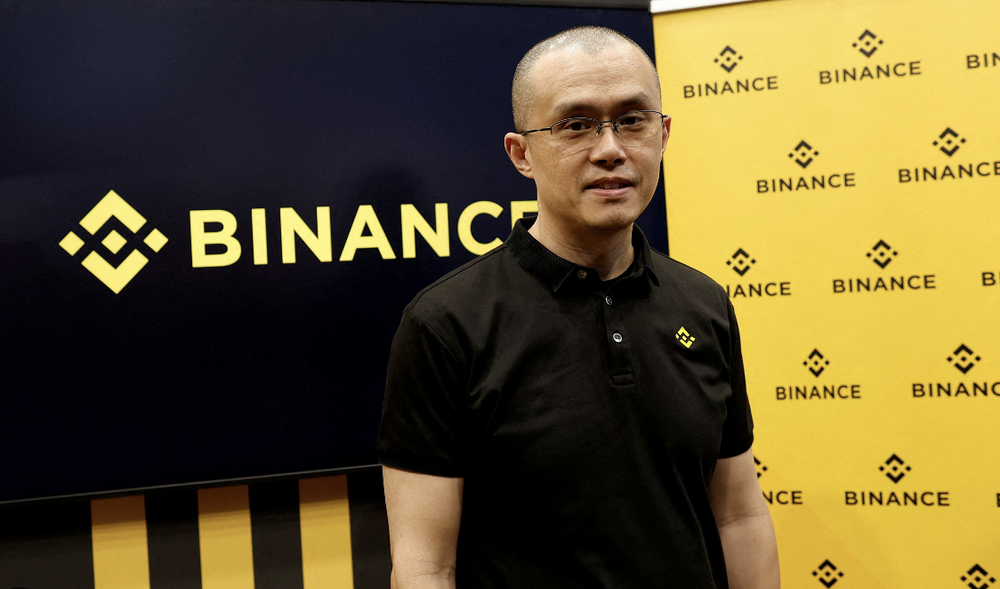Who is creating Binance A Borderless Company in 4,000 Resumes
Creator of Binance, a Borderless Company, in 4,000 ResumesAuthor: Wang Hanyang, Source: crypto4.wtf
For most people who are not interested in blockchain, Binance may just be a company that occasionally appears in technology news. But today, Binance has become one of the most special and important companies in both the financial and technology sectors: According to reports, Binance has about 8,000 employees (recent news suggests that Binance is downsizing), but this company does not have a headquarters, and employees are scattered remotely around the world. Many people may have never met their colleagues from the time they join to the time they leave. Binance may have become the largest distributed company in history. If people 30 years from now (about the time since the birth of the Internet) study the history of the Internet, Binance’s organizational structure will definitely be an unavoidable chapter.
In terms of business influence and profitability, Binance is also very important. Let’s compare it with the leader in the smartphone industry, Apple: According to Tokeninsight data, Binance had a market share of 50.6% in the cryptocurrency exchange market in Q2 2023, while according to StrategyAnalytics data, Apple’s market share in the smartphone market in Q4 2022 was 24%, which is the highest Q4 market share ever for Apple – although this number is significantly lower compared to Binance’s market share. Even in the cryptocurrency winter of 2022, according to CoinDesk data, Binance’s spot trading volume still reached $5.29 trillion. The revenue and sales of Apple’s App Store ecosystem in 2022 was $1.1 trillion, of which over 90% was zero commission. Binance, on the other hand, charges fees for most of its trades. So if Apple is the dominant player in the smartphone industry, then Binance is the absolute leader in the cryptocurrency market right now.
The combination of being the absolute leader in the entire industry and the pioneering work model has made Binance one of the most important companies of our time.
- LianGuai Morning Post | Federal Reserve Meeting Minutes Core Inflation Will Significantly Decrease in the Second Half of the Year
- Is the ‘big boss’ of the cryptocurrency world, Binance, starting to decline?
- Vitalik Buterin What are my thoughts on Community Notes?
But on the other hand, Binance is also a mystery. In fact, Binance is the biggest mystery on the global Internet today: rarely has a company been so important to an industry, yet we know so little about it.
On the 42nd day after the launch of its product, Binance ranked tenth in trading volume globally; on the 92nd day, it ranked fifth globally; on the 156th day, it ranked third globally; and on the 165th day, it became the global number one – and it remains so until now. How did it achieve all of this?
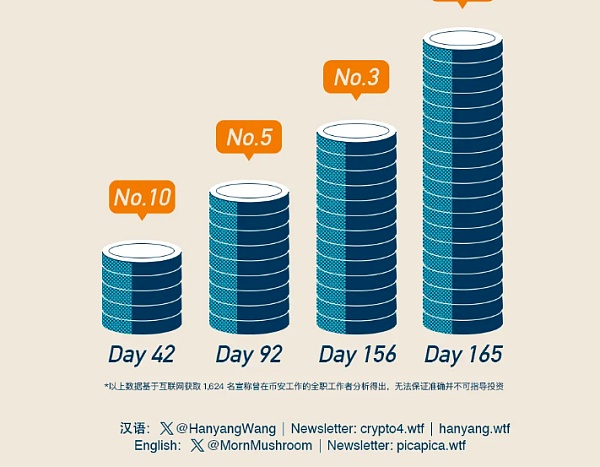
I have read almost all the articles about Binance on the Chinese and English Internet, but I still cannot answer my questions about Binance. I cannot even ask key questions based on the information available online. So I plan to fill in the gaps about Binance through extensive investigation, research, and interviews, and by analyzing and organizing the information.
Studying and visiting Binance is not easy. I hope to take advantage of every opportunity and information available, starting from the details, to launch this project. With a series of articles, I hope to tell the story of Binance in an interesting and comprehensive manner and, more importantly, to encourage more friends to study and analyze Binance, a company that cannot be avoided in the era we live in.
In the first article, let’s talk about the group of people who created Binance. Thanks to @LianGuaiincompiler for his help, he collected information from over 4,000 people who have worked or have worked at Binance, and wrote them down on paper with a pencil.
Please note: the information we collected may not be entirely accurate, and these information may not cover all aspects of Binance.
The data in this article is based on the information of 4,182 people who claim to have worked or have worked at Binance, Binance US, or have worked here before, which we copied from the internet onto paper. Many people’s information is incomplete. Among them, 3,714 people have relatively more complete data. Among these 3,714 people, 1,624 people should be current or former full-time employees of Binance, and the others are interns, part-timers, or freelancers who have cooperated with Binance. Unless otherwise specified, the following data are based on the 1,624 full-time employees.
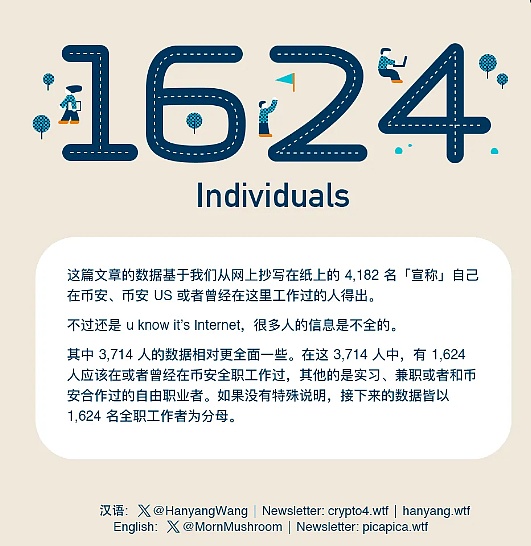
“Borderless” Company: Singapore and the Middle East Have the Most Employees
Although blockchain has no borders, blockchain companies do. However, Binance seems to be more “borderless” than any other company: in our sample, the people who created Binance come from 69 different countries or regions. Among them:
Singapore: 176 people
United Kingdom: 78 people
United Arab Emirates: 75 people
United States: 27 people
India: 24 people
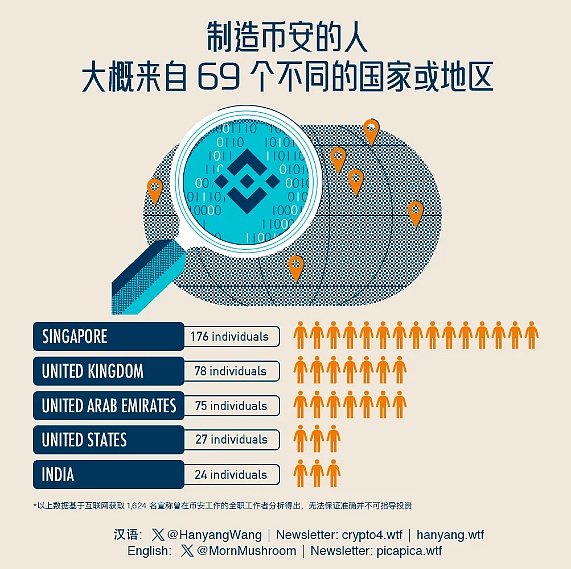
As expected, Binance has a large number of employees in Singapore. The notebook also shows that there is an employee working in the Cayman Islands—I thought this island was only used for company registration.
You may ask, what about Dubai? After all, the founders, Changpeng Zhao and He Yi, are in Dubai—Dubai is the economic center of the United Arab Emirates, but it is a city, not a country. If we rank by city, Dubai will be the first. There are 65 people in Dubai, 64 people in London, and 16 people in Amsterdam. These employees are distributed in a total of 86 cities.
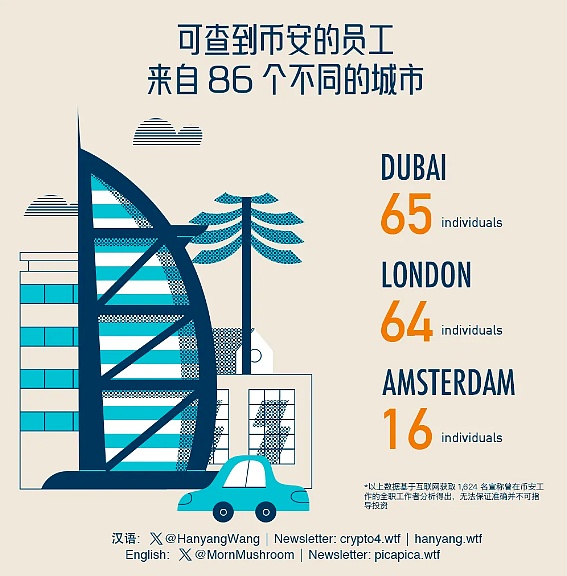
As a company born in China, there are still people working for Binance here—however, the data we collected only has one person. It is not ruled out that Binance employees working in mainland China may deliberately hide their affiliation with the company.
Before Binance, the largest remote working company was probably GitLab among the well-known remote working companies. GitLab is an open-source software company, and they claim to be the largest remote working organization in the world: 2,038 full-time employees and their 358 pets are distributed in 65 different countries or regions.
If we have more specific information, I believe Binance should take the title of “the largest remote working organization in the world”. However, I don’t just want to compare the scale, but to prove that Binance is indeed a remote working company compared to GitLab. Many people don’t believe that Binance is a remote working company. They more or less think that Binance only claims to be remote because it is afraid of regulation and has no headquarters. Some people also believe that Binance’s so-called “remote working” is just a common state for multinational companies, but the reality is likely not like that. Binance and GitLab should both be regarded as the largest remote organizations on this planet.
If your perspective is not limited to full-time work, then the 3714 people on our notebook who have had a relationship with Binance come from a total of 114 countries. This is much broader than the range of Apple Stores, where only 26 countries or regions have Apple Stores worldwide. However, there are 167 countries or regions where Apple Music is available, but Binance explicitly supports only 47 countries or regions on its official website.
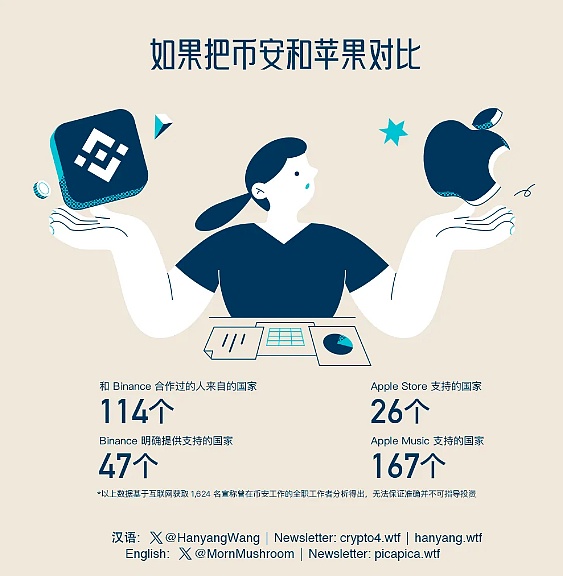
Although geographically, the distribution of Binance employees is very diverse, from a school perspective, three of the top five universities attended by Binance employees are located in Singapore, which shows that Singapore is indeed one of the centers of the crypto world.
National University of Singapore: 54 people
Nanyang Technological University: 47 people
University of London: 25 people
Singapore Management University: 24 people
National Taiwan University: 23 people

If we broaden the criteria to include all 3714 people who have had cooperation with Binance, there are quite a few people with study experience in the UK:
University of Cambridge: 219 people
National University of Singapore: 179 people
Nanyang Technological University: 128 people
Singapore Management University: 90 people
University of London: 90 people
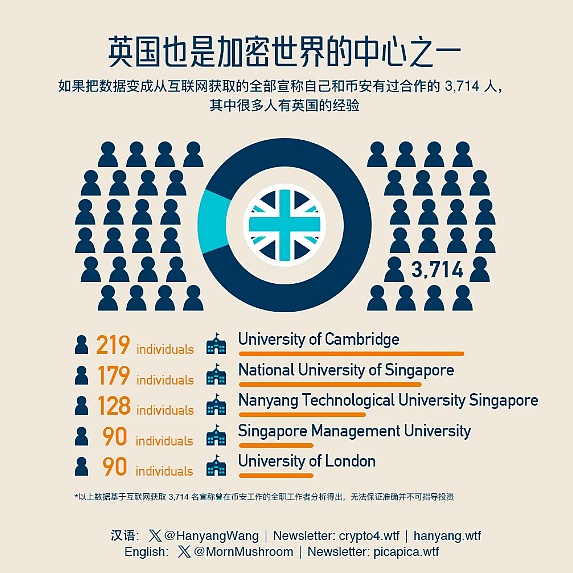
One speculation is that as a rapidly growing company, Binance should have a demand for interns. As a company led by Chinese, English-speaking Chinese would be an ideal recruitment choice. However, recruiting in China is not easy, so Chinese students studying abroad are very suitable.
The UK has 170,000 Chinese students, the largest source of students. Binance can provide these students with suitable internship opportunities. In my observation, Chinese students studying in the UK have greater difficulty finding internships and jobs locally than Chinese students in North America, so more people will flock to blockchain companies that can recruit globally. Singapore has a total of only 50,000 international students, with Chinese students accounting for a third. Therefore, the number of interns will inevitably not be particularly large.
Zhao Changpeng, who loves Uber, has recruited the most former Amazon employees and adjusts the layout like an internet CEO
A former high-level executive of Binance told me that Zhao Changpeng is someone who loves reading books. In the early years, Binance had a core management team of more than 40 people, and Zhao Changpeng would often throw books he had read into the group for everyone to think about together and jokingly “threaten” that those who didn’t read would be kicked out.
Most of these books are about management and company biographies. Among many companies, Zhao Changpeng particularly likes biographies about Uber and Netflix. Especially Uber, because the challenges faced by this ride-hailing giant in its early years were similar to those faced by Binance.
Zhao Changpeng not only reads, but also learns and applies. Later, he also recruited many people from Uber. This can be evidenced by our full-time staff sample: 110 people have had work experience at Uber, ranking sixth in our data. The top five are:
Amazon: 204 people
Shopee: 153 people
Citibank: 134 people
Agoda: 119 people (an online hotel booking website)
Coinbase: 111 people (a US cryptocurrency exchange)
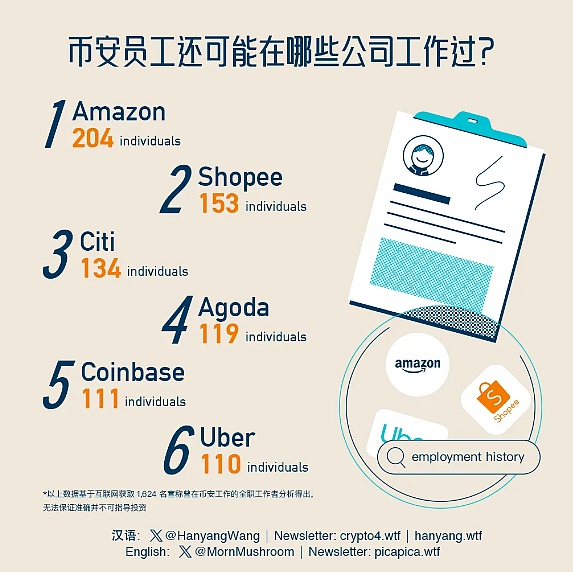
So what are these people doing at Binance?
Business-related: 761 people (46.86% of the total)
Technology-related: 329 people (20.26% of the total)
Operations-related: 243 people (14.96% of the total)
Uncertain: 291 people (17.92% of the total)
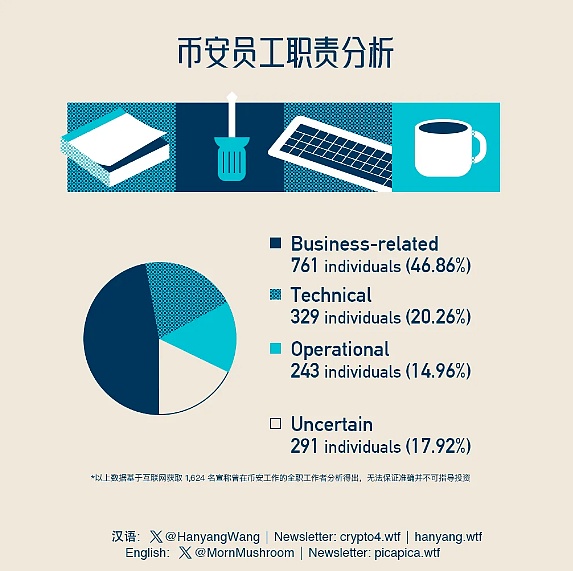 We are unable to determine the positions of many people because the collected information may not be accurate and lacks key information. In this limited dataset, we can see that nearly half of the positions are related to business, which may reflect Binance’s emphasis on business development, sales, marketing, and strategy – essentially the pursuit of growth and market share expansion.
We are unable to determine the positions of many people because the collected information may not be accurate and lacks key information. In this limited dataset, we can see that nearly half of the positions are related to business, which may reflect Binance’s emphasis on business development, sales, marketing, and strategy – essentially the pursuit of growth and market share expansion.
This reminded me of a story told by an interviewee: After Binance acquired CoinMarketCap, a cryptocurrency price tracking website and data provider, the interviewee participated in the redesign of CoinMarketCap. During the discussions on the redesign, Zhao Changpeng carefully examined whether different ad placements were suitable. In the end, Zhao Changpeng requested the removal of prominent ads on the homepage and only kept a few small ad placements, while suggesting that the team add ads in positions that users wouldn’t notice, prioritizing user experience.
The removed ads accounted for a large portion of CMC’s revenue, but Zhao Changpeng believed, “If the user experience is worse than that of competitors, users will eventually churn, and high current revenue will be meaningless.” The final result was to only retain small ad placements and smoothly insert ads in positions where users wouldn’t notice. However, since the majority of ad revenue was gone, Zhao Changpeng also adjusted the KPIs of the employees accordingly. The interviewee commented on Zhao Changpeng: broad perspective, focusing on key points.
Over a quarter of the sample have been promoted at Binance
I attempted to determine from the data which industries Binance tends to recruit talent from, and unsurprisingly, it is the technology and finance industries. One interesting thing is that through our small sample data, it can be seen that the proportion of internal promotions among Binance employees is approximately 26.46%. This may indicate that Binance places great emphasis on internal promotions within the organization or transfers employees between different branches or subsidiaries.
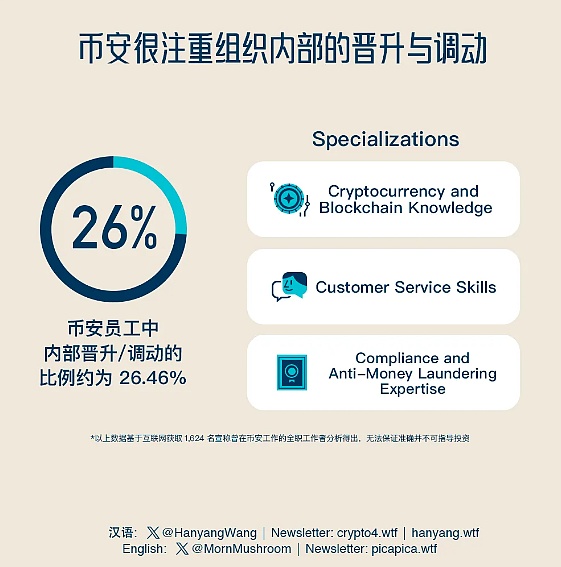 From the descriptions of these employees about their positions, Binance’s requirements for skills mainly focus on three areas: knowledge of cryptocurrencies and blockchain, customer service skills, and compliance and anti-money laundering expertise – Binance seems to place great importance on compliance.
From the descriptions of these employees about their positions, Binance’s requirements for skills mainly focus on three areas: knowledge of cryptocurrencies and blockchain, customer service skills, and compliance and anti-money laundering expertise – Binance seems to place great importance on compliance.
Binance and compliance is a controversial topic. In most countries, Binance is non-compliant. Especially the dispute between Binance and SEC. Although Binance has been sued by the SEC, most observers believe that this is just a prelude to a more intense struggle, and the real battle should still lie ahead. Moreover, the process of Binance’s efforts to pursue compliance can basically link the entire history of the company, which is worth elaborating in the future.
This article is just a basic analysis of Binance, and the questions it raises far outweigh the answers that can be obtained.
From the limited data, Binance is a globally distributed and rapidly growing exchange. How do its employees organize and cooperate? What kind of people manage it, and through what specific methods? How does it face increasingly severe challenges? Where might problems arise? These questions all require further exploration.
Binance is like a map full of war fog, and we hope that through our efforts, we can gradually explore the whole picture. Because Binance is destined to become one of the most important companies of this era.
We will continue to update Blocking; if you have any questions or suggestions, please contact us!
Was this article helpful?
93 out of 132 found this helpful
Related articles
- Evening Must-Read | The Future of MEV is the Future of the Cryptocurrency World. Has the Importance of the MEV Track Been Underestimated?
- Telling Stories and Sharing Rights. Can Ctrip Play with NFTs Overseas?
- Opside ZK-Rollup LaunchBase Major Update Supports multiple L1 options such as ETH/BSC/Polygon testnet.
- What is Mantle Network? Ethereum Layer 2 Solution Guide
- Interpreting the Products of Frax Finance and the Synergy between them
- The US Department of Justice accuses SBF of misappropriating over $100 million of customer deposits for political donations.
- Exclusive Interview with Arbitrum Asia-Pacific Head How Arbitrum is Dealing with the L2 Battle

